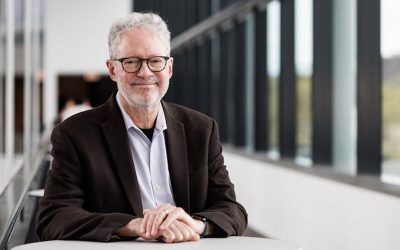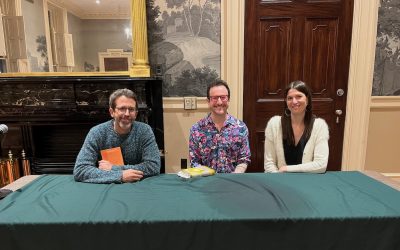Dr. Emily A. Phifer G’22 helps herself and other process grief
October 2023 – Dr. Emily A. Phifer G’22, who is in her 56th year of educating others, has no plans of slowing down.
She has spent her entire career in education, teaching various ages from infants and toddlers all the way to graduate students.
After retirement and caring for a sick relative, Phifer asked herself “what about me, what do I do now?” Already earning two master’s degrees, Phifer came to Drew’s Caspersen School of Graduate Studies to earn her doctorate in Arts & Letters. “I’m going for it, gray hair and all,” she said.
When asked why she chose to come to Drew, she said she was intrigued by the interdisciplinary nature of the Arts & Letters program. “I was able to design a program that I want—that fits me and my schedule,” said Phifer. “I looked at the professional structure of the program and the course selections and it was wealthy. I jumped into it right away.”
When the school moved to fully virtual in response to the pandemic, Phifer had written one chapter of her dissertation. “I had to do something to distract myself from all the sadness, so I wrote about sadness.”
Phifer has encountered great loss in her life, losing her mother when she was five, followed by her grandmother when she was six. While studying grief in literature during one of her first classes at Drew, she realized that she had never dealt with her own grief—an aha moment that turned the direction of her dissertation.
“I had not owned and dealt with my own grief and loss, and if I had, it was unconscious to me,” she said. “It was then that I decided to write about grief and loss and how this can contribute to healing. I didn’t want to write a paper about me, but I wanted to write a paper that spoke to me because I needed to hear what it had to say. I was a witness and an audience. For my own healing process, I need to hear what the paper was explaining.”
Further, Phifer wanted to be true to her readers. “If I’m going to write about something, I better know what that is,” she said. “How could I convince an audience that I know what I’m talking about—that I’m honest, truthful, and dependable?”
“When I wrote this paper, I had the feeling I did what they [Phifer’s mother and grandmother] wanted me to do. It was a relief.”
While retired from full-time work, Phifer is “moving full steam ahead” in her part-time ventures as an adjunct professor at Rutgers University, teaching a graduate-level course on corrective and diagnostic reading. “Some people live their lives by their age,” she said. “I don’t.”
In addition, she speaks with various healing groups, utilizing her research and knowledge of grief and loss to help others.
She says this work of doing for others is giving. “I’m at a point in my life where I can be strictly academic and clinical. It’s my healing, but I have enough to give to them.”
“I am thankful that I was at Drew and meeting the people that I did at that time in my life,” said Phifer of her experience at Drew. “I was able to switch gears and move my dissertation in this direction. I had all the support that I needed at all times. I can’t think of any other point in my life where I would have been able to do that.”



